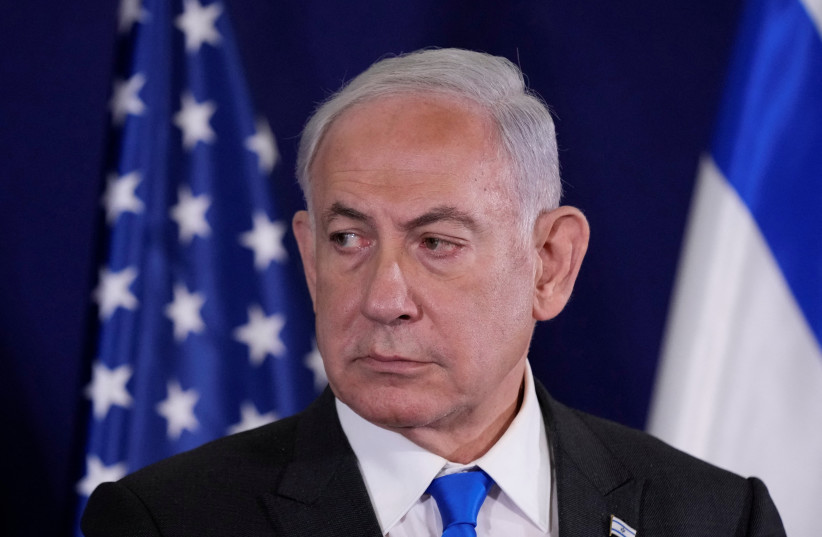Over several generations, Palestinians have earned the label of a stateless people repeatedly unwilling to take “yes” for an answer.
As recently as 2001 and, again, in 2008, Israeli peace and statehood plans were spurned without so much as a counterproposal by former Palestinian Liberation Organization (PLO) chairman and former Palestinian Authority (PA) president Yasser Arafat or by Palestinian Authority President Mahmoud Abbas.
Now, in a role-reversal, it is Jerusalem saying “no” on the matter of creating a long-term path to a two-state solution.
After the butchery of October 7 and the ongoing horrors faced by some 130 hostages still held by Hamas for more than three months, deep under Gaza, it is understandable that no Israeli will hand over responsibility for its security to a Palestinian entity.
Discussion of a Palestinian state without its leadership’s first undertaking fundamental reforms is little more than a glib talking point.
Netanyahu should begin saying 'yes'
Meanwhile, Prime Minister Netanyahu, seeing a political life-raft, is cynically positioning Israel as the rejectionist party. Instead of saying “no” to President Joe Biden, the most pro-Israel of allies, Israel should return to the “yes, but” message that it is prepared to take risks for peace in tandem with Palestinian steps that prove it can be a reliable partner.

What would these initial steps entail? They would begin with putting an end to the culture of hate that permeates Palestinian society in both Gaza and the West Bank – the sermons in mosques that agitate for violence; the naming of schools, public squares, and sports facilities for infamous terrorists; the schoolbooks that openly teach children that Jews are the enemy and that only Palestinians have a rightful place anywhere from the river to the sea; and the practice of paying families large stipends when brainwashed teens end up dead or in Israeli jails.
“Yes, but” as an Israeli reply to the prospect of a future Palestinian state would put the onus on the Palestinians to undertake much needed changes before negotiations could commence. Then benchmarks within fixed timelines would have to be met before steps toward independence could proceed. Like others before them, Palestinians would have to learn to live with a situation that initially grants them autonomy or limited statehood, with the pace of political progress dependent on successfully implemented reforms.
Carrying out these long-overdue measures in the wake of the appalling civilian deaths in Gaza will be bitter and burdensome, but essential.
This “Standards before Status” construct is a familiar one in international relations. Following World War II, both Germany and Japan needed to gain the trust of their former enemies before being granted the full measure and prerogatives of statehood. Similarly, after the wars in the Balkans, widespread international recognition of Kosovo’s statehood was predicated upon its meeting a UN-endorsed list of political, economic, and societal benchmarks.
Meanwhile, Israel cannot expect a free pass. Even as it revamps its institutions of government, the military, and the intelligence services, it must put an end to armed settler vigilante attacks in the West Bank. Just as the PA is expected to suppress extremists, the IDF cannot allow Israelis to act outside the law.
Moreover, a momentous debate must begin about whether the entire settlement project enhances or diminishes Israel’s security. We think the latter. Nearly 20 years ago under Prime Minister Ariel Sharon Israel not only vacated all of Gaza but also two settlements in the northern part of the West Bank.
Sharon convinced that those settlements were not essential, took this small, unilateral initiative designed to test both the Israeli and Palestinian public on their readiness to make conciliatory adjustments in line with security objectives.
If Palestinians and Israelis are unable to summon the will or the way forward on their own, an international peacekeeping force, similar to the KFOR still in place in independent Kosovo – may need to be created, likely under US leadership.
Unfortunately, neither the Israelis nor Palestinians currently have leaders with a realistic vision for the so-called “day after.” Israel, badly traumatized and still suffering a leadership vacuum that won’t end until Netanyahu departs the political scene, can’t discuss its long-term relationship with the Palestinians until it reestablishes deterrence, as much for the sake of the collective psyche of its citizens as for proving its military mettle in a tough neighborhood.
Biden, still eager to see an Israel-Saudi partnership as a bulwark of regional stability, also appreciates that would-be allies in the Gulf and elsewhere are eager for Israel to succeed quickly in reestablishing its footing.
Demands for the two-state solution may be well-intentioned but are empty gestures if they don’t take into account the long path ahead. A “standards before status” approach (as in Kosovo) would allow all parties to say “yes” by providing the path of accountability and transparency that is necessary before moving to negotiations for a final status agreement, where even more difficult decisions await.
Mike Haltzel is a senior fellow at the Johns Hopkins University School of Advanced International Studies.
Norm Kurz is president of The Kurz Company, a consulting group. Both were senior advisers to Joe Biden when he served as a member of the US Senate.
